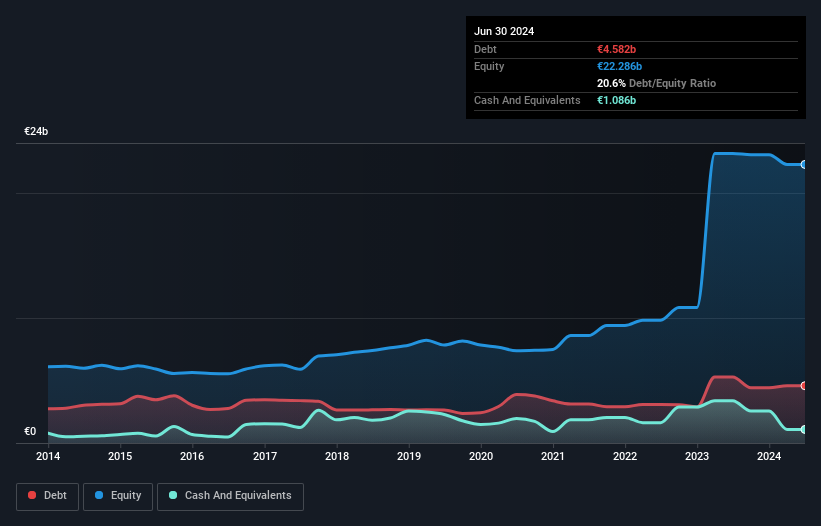Warren Buffett famously said, 'Volatility is far from synonymous with risk.' So it seems the smart money knows that debt - which is usually involved in bankruptcies - is a very important factor, when you assess how risky a company is. Importantly, DSM-Firmenich AG (AMS:DSFIR) does carry debt. But is this debt a concern to shareholders?
When Is Debt Dangerous?
Debt assists a business until the business has trouble paying it off, either with new capital or with free cash flow. In the worst case scenario, a company can go bankrupt if it cannot pay its creditors. While that is not too common, we often do see indebted companies permanently diluting shareholders because lenders force them to raise capital at a distressed price. By replacing dilution, though, debt can be an extremely good tool for businesses that need capital to invest in growth at high rates of return. When we think about a company's use of debt, we first look at cash and debt together.
View our latest analysis for DSM-Firmenich
What Is DSM-Firmenich's Debt?
The image below, which you can click on for greater detail, shows that DSM-Firmenich had debt of €4.58b at the end of June 2024, a reduction from €5.28b over a year. However, because it has a cash reserve of €1.09b, its net debt is less, at about €3.50b.

How Healthy Is DSM-Firmenich's Balance Sheet?
We can see from the most recent balance sheet that DSM-Firmenich had liabilities of €4.54b falling due within a year, and liabilities of €5.99b due beyond that. Offsetting this, it had €1.09b in cash and €3.10b in receivables that were due within 12 months. So its liabilities outweigh the sum of its cash and (near-term) receivables by €6.34b.
While this might seem like a lot, it is not so bad since DSM-Firmenich has a huge market capitalization of €31.3b, and so it could probably strengthen its balance sheet by raising capital if it needed to. But it's clear that we should definitely closely examine whether it can manage its debt without dilution. The balance sheet is clearly the area to focus on when you are analysing debt. But ultimately the future profitability of the business will decide if DSM-Firmenich can strengthen its balance sheet over time. So if you're focused on the future you can check out this free report showing analyst profit forecasts.
Over 12 months, DSM-Firmenich reported revenue of €12b, which is a gain of 42%, although it did not report any earnings before interest and tax. Shareholders probably have their fingers crossed that it can grow its way to profits.
Caveat Emptor
Even though DSM-Firmenich managed to grow its top line quite deftly, the cold hard truth is that it is losing money on the EBIT line. Indeed, it lost €32m at the EBIT level. Considering that alongside the liabilities mentioned above does not give us much confidence that company should be using so much debt. Quite frankly we think the balance sheet is far from match-fit, although it could be improved with time. We would feel better if it turned its trailing twelve month loss of €190m into a profit. So to be blunt we do think it is risky. When we look at a riskier company, we like to check how their profits (or losses) are trending over time. Today, we're providing readers this interactive graph showing how DSM-Firmenich's profit, revenue, and operating cashflow have changed over the last few years.
Of course, if you're the type of investor who prefers buying stocks without the burden of debt, then don't hesitate to discover our exclusive list of net cash growth stocks, today.
New: Manage All Your Stock Portfolios in One Place
We've created the ultimate portfolio companion for stock investors, and it's free.
• Connect an unlimited number of Portfolios and see your total in one currency
• Be alerted to new Warning Signs or Risks via email or mobile
• Track the Fair Value of your stocks
Have feedback on this article? Concerned about the content? Get in touch with us directly. Alternatively, email editorial-team (at) simplywallst.com.
This article by Simply Wall St is general in nature. We provide commentary based on historical data and analyst forecasts only using an unbiased methodology and our articles are not intended to be financial advice. It does not constitute a recommendation to buy or sell any stock, and does not take account of your objectives, or your financial situation. We aim to bring you long-term focused analysis driven by fundamental data. Note that our analysis may not factor in the latest price-sensitive company announcements or qualitative material. Simply Wall St has no position in any stocks mentioned.
About ENXTAM:DSFIR
DSM-Firmenich
Provides nutrition, health, and beauty solutions in Switzerland, the Netherlands, rest of Europe, the Middle East and Africa, North America, Latin America, China, and rest of Asia.
Flawless balance sheet and fair value.
Similar Companies
Market Insights
Community Narratives





